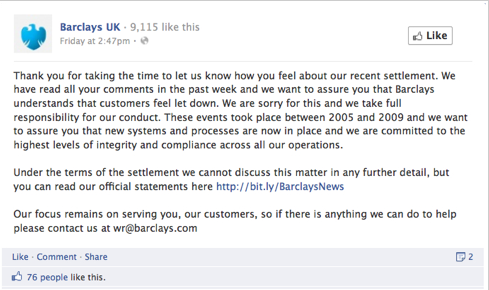We Are Social Asia Tuesday TuneUp #36
Chinese social media users ‘happier’ than Westerners
Researchers from two universities in Holland and in China studied 46 million posts from Twitter and Sina Weibo. While almost all of the posts on Sina Weibo were from China, 80% of all tweets were from the United States. The study revealed that 79% of the messages on Weibo were expressing positive sentiments as compared to 71% on Twitter. The Chinese largely avoided mentioning large groups such as political parties – only 3% of the Chinese referred to ‘organisations’ as compared to 16% on Twitter. Sina Weibo users also posted on a wider range of topics with 19% more messages over the weekend as opposed to 11% less tweets on average over weekends. While the social media scene is vastly different in China and the West, the reason behind a less negative outpour on Weibo could be largely attributed to the tight regulation of social media in the nation.
Facebook invests in underwater net cable for Asia
In order to support their growth in South Asia, Facebook is investing in an underwater internet cable to be built from Malaysia through to Japan to boost the Internet speed. A Facebook spokesperson commented:
Our investment in this cable will help support our growth in South Asia, making it possible for us to provide a better user experience for a greater number of Facebook users in countries like India, Indonesia, Malaysia, the Philippines, Hong Kong, and Singapore.
Facebook definitely has its eyes on Asia where it has made big progress in markets such as Japan, Korea, and Thailand. Social Bakers has recently announced that Asia has overtaken North America to be the second-largest continent in terms of Facebook users. Asia as a whole only has an online penetration rate of 6 percent, so the number of Facebook users will continue to grow exponentially as infrastructure allows for more people to get on board.
Mobile messaging apps threaten Facebook and other social networks in Asia
With social media sites focusing on building their service on mobile phones, a genre of communication apps – mobile messaging apps – are gathering speed as an alternative point of messaging. Skype led the change in early days but today, WhatsApp and a number of Asia-based messaging apps following the principle to connect people via text messages and calls see a huge amount of success. For instance, Japan’s Line had 45 million users in less than a year while Korea’s Kakao Talk registered 52 million users. WhatsApp, the more popular one of the lot claims to receive 2 billion messages across its platform every day.
While mobile carriers have partnered with Facebook and Twitter, their partnership focuses on the low-end, pre-paid users to enjoy free access of the social networking platforms such as Facebook Zero on feature phones. However, the messaging apps target the other end of the spectrum – the smart phone users. This is the caution why apps will continue to rival Facebook as they are designed for mobile, offering a platform to connect with friends for free. While Facebook’s mobile ‘messenger’ is a stripped down version of the private messaging aspect of its app, the Facebook offering is reviewed as ‘heavy’, taking longer to load and requiring more information than mobile messaging apps. Many may value the fact that Facebook shows older messages but they are not particularly relevant to quick instant messages. Obviously, this is because the Facebook app also lacks a mobile-centric chat approach of WhatsApp and others. Not only are the mobile messaging apps gaining significant attraction in Asia and other emerging markets that Facebook is looking to grow within, but they have relationships with operators and offer more functionality than social networks.
Vietnamese authorities watching out for Baidu’s social site in Vietnam
The largest Chinese search engine Baidu is said to launch a new social network site in Vietnam. The site is called ‘Baidu Tra da quan’ which stands for Baidu Tea Stone Pub and is currently located at tieba.baidu.com.vn as a ‘coming soon’ page. Despite the hype from netizens on this forum-like social site, Vietnamese authorities have said that they have not received any application from Baidu to set up a social site in the country. It is evident that Baidu is looking to penetrate the Vietnamese market as the company launched a portal site last year together with its Yahoo answers equivalent.
Survey reveals marketers are more interested in awareness than ‘likes’
A survey from Ad Age and Citigroup asked marketers who buy Facebook ads about what their goals are and 45.9% responded that building awareness and sentiment for their brands was their top priority. In second place was driving traffic to brand websites with 17.6% followed by staying in touch with customers, generating likes / sales leads and finally social commerce:
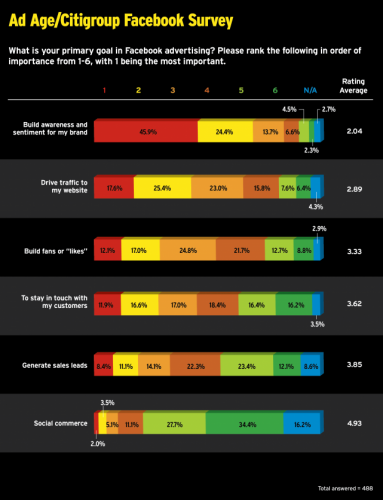
Getting behind the code of Facebook’s new “Want” button
Last week developer Tom Waddington discovered the ‘Want’ button for Facebook, andhas now revealed further findings after taking a deeper look at the code behind it.

Using the Graph API Tom was able to generate updates and stream stories, hence revealing the code. The Want/Unwant button includes ‘socialcommerce’ and there are a number of actions associated with purchases, including “product.purchased”.
This would allow users to share product purchases, charitable donations or items purchased directly within Facebook games to their profile pages and Timeline.
App usage to affect how Facebook targets mobile ads
According the the Wall St Journal, Facebook is to release a new type of mobile advertising, that will target consumers based on the mobile apps they use. Using Facebook Connect to track this behavior, the social network will then target ads based on this data. The ads are due to be announced next month and could prove a great revenue generator for the team.
Companies like Apple and Google don’t track what its users do in apps to target mobile ads to them. This certainly will raise privacy concerns – to which the social network is no stranger to.
Facebook’s App Store hits UK shores
Facebook’s App Centre has begun rollout in the UK and features apps including Spotify, The Guardian, Deezer and Livesport.TV. Facebook hopes the App Centre will drive additional revenue streams through app purchases – gaining it a neat 30% cut of the revenue.
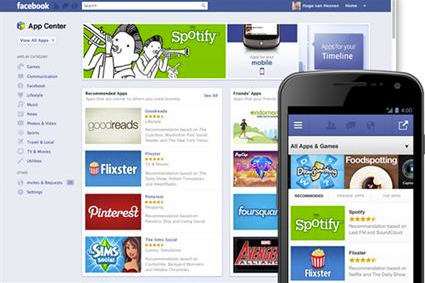
The App Centre will allow developers to charge for Facebook apps for the first time and host Pages to promote them. The App Centre launched in the US in June and is continuing its global rollout.
Facebook Insights made more accurate and now include mobile
Last week, Facebook made two important updates to its Insights to help Page owners understand more about the true reach of their posts. This now includes mobile data, previously this was only desktop, and a change to desktop News Feed views. In a move to improve efficiency, the News Feed will load fewer stories and only load more when the user scrolls down the feed. As impressions and reach is calculated upon load of the story in the Feed, the reach shown in Insights will be far more accurate as to what users have actually viewed.
Twitter introduces simpler search
Via a blog post on Friday last week, Twitter announced that it has introduced search autocomplete and ‘People you follow’ search results via twitter.com. This adds to recent updates relating to query suggestions and spelling corrections.
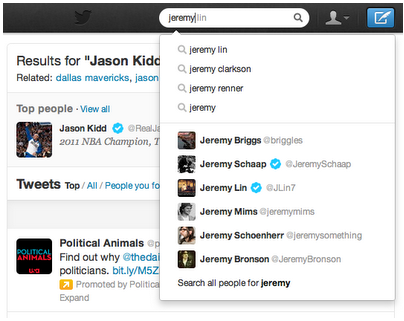
Search autocomplete reveals a drop-down menu of possible matches as you type – much like Google search – and you can select your query before you finish typing it. In addition Twitter has introduced spelling corrections, related search suggestions, search results with real names and usernames and results from people that you follow.
Twitter goes football mad for the Euro 2012 final as 16.5m tweet
Stats released from UEFA on the Euro 2012 Final show that the match beat the Tweets per second record for a sporting event previously held by April’s Chelsea vs Barcelona Champions League semi-final. Amazingly, when Juan Mata Garcia (@juanmata10) scored, around 15,358 tweets where generated per second. The match saw 16.5 million tweets and Fernando Torres was the most popular player, with the #Torres hashtag clocking up 18,000 tweets. Spain also managed to generate the more positive mentions over Italy.
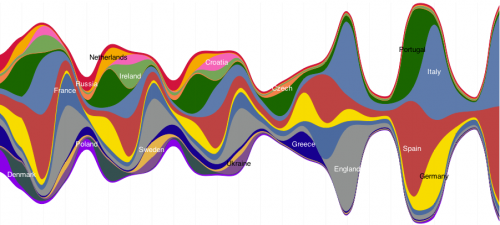
The Streamgraph above shows the volume of tweets during the full Euro 2012 championship period, broken down by country. You can see the full country-by-country results here.
Leeds Rhinos replace shirt names with players Twitter handles
In a social commitment above and beyond, plus a nice social marketing move, UK Rugby League team the Leeds Rhinos decided to take to the field in shirts with their Twitter handles instead of traditional names on the back of their shirts. This will be the first time a rugby team has done this and special preview editions of the shirts will be available.

Tinie Tempah & Nike lead a scavenger hunt for his new Blazer trainers
To celebrate the launch of Tinie Tempah’s new clothing line ‘Disturbing London’, the rapper has created a special edition of Nike’s Blazer trainers. These trainers were to be revealed once a scavenger hunt on twitter found their location.
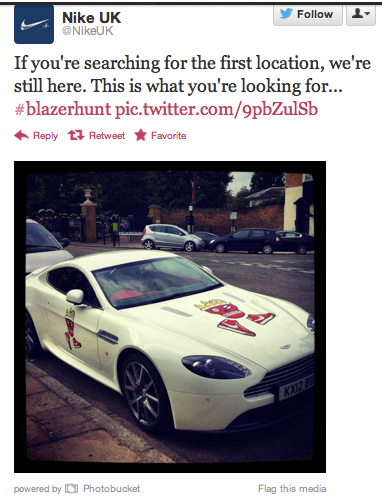
The hashtag for the activity was #blazerhunt and clues revealed 6 locations around London. Whoever was fastest to the locations got one of the only 60 pairs made.
Heineken creates social hub for Olympics fan-generated content
As an official sponsor of the London 2012 Olympic and Paralympic Games, Heineken is asking fans to upload their photos celebrating the Olympics to its fan hub. These will then be whittled down to the cream of the crop, which will be displayed ‘near-live’ on JCDecaux’s Transvision screen at Charing Cross station and on digital outdoor screens throughout London Underground and rail stations. The campaign will also use a sponsored hashtag #celebratelondon2012 on Twitter. The online fan hub will go live next week.
Get extra Tesco Clubcard points by promoting them on Facebook
UK supermarket giant Tesco, is to offer Facebook users double Clubcard points if they like, share and buy products from its ecommerce site. As part of the four week trial, customers need to register for the Share & Earn Facebook app via the Tesco Facebook Page. Tesco has an impressive 839,703 likes on its Facebook page and certainly has a good base to work from – one to watch.
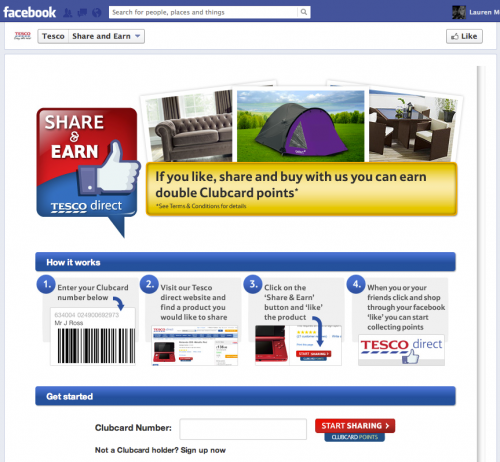
FemFresh utter fail on Facebook
Feminine hygiene brand FemFresh last week suspended its Facebook page after receiving negative consumer complaints on its page. Our very own Tarryn Blackwood spoke to The Drum about her thoughts on the issue:
It’s clear that Femfresh hasn’t understood or embraced what social is all about. They managed to undo a whole year’s work of community building and management just because people didn’t have nice things to say about them. Not only did they swiftly dump their social agency in a transparent attempt to pass the buck, they also proceeded to run crying to Facebook for help in making the bullies go away.
Femfresh’s biggest mistake was to keep quiet, rather than making the decision to either stand by their campaign, or pulling it because of the public backlash.
Barclays times its Facebook campaign to imperfection!
So we’ve all heard about the ‘issues’ that Barclays Bank has had in recent days, with its disgraced CEO and Chairman steping down amid accusations of Libor-rigging. To top it all off, this news came just as Barclays introduced its Facebook fans to Dan, a normal guy who has some personal finance tips for us, introduced as:
Dan’s a HR manager and spends £5 a day on lunch. That’s about £100 a month; enough to buy a ticket to the vintage car festival he really wants to go to in August. Bringing food from home for a couple of months would mean a more memorable end to the summer. So come on Dan, get making those sandwiches and book those festival tickets.
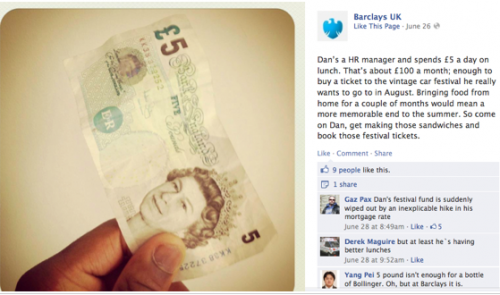
Oh dear, and so the ensuing comments came in. Including a personal favourite:
Bob’s a CEO and spends £5,000 a day on Bollinger. That’s about £155,000 a month; enough to buy a classic Ferrari at the vintage car festival he really wants to go to in August. Rigging LIBOR for a couple of months would mean a more memorable end to the summer.
After a long social silence, Barclays eventually took to its UK Facebook page with a big apology over the Libor issues. It was a brave move from Barclays and one that in a situation like this, is the only option for social – be honest, own up and say sorry.
